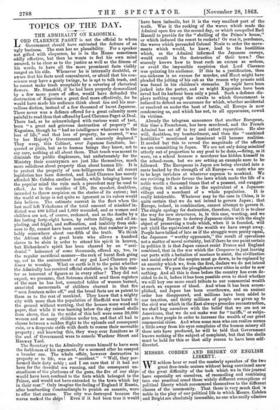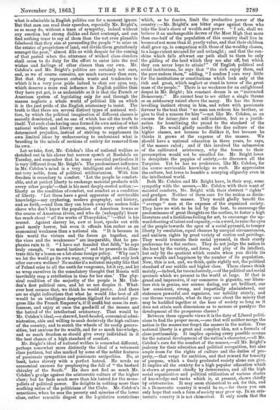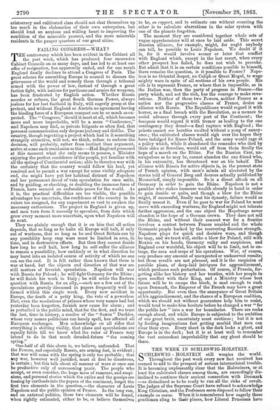MESSRS. COBDEN AND BRIGHT ON ENGLISH LIBERTY. .
WE seldom hear or read the masterly speeches of the two great free-trade orators without being convinced anew of the great difficulty of the task which we in this journal have especially set ourselves, of reconciling and combining into one practical creed those widely different conceptions of political liberty which recommend themselves to the different classes of the community. That there is very much that is noble in the play of our political life to which Messrs. Cobden and Bright are absolutely insensible, no one who really admires what is adminsble in English politics can for a moment ignore. Mut that men can read their speeches, especially Mr. Bright's, as so many do, without a trace of sympathy, indeed without any emotion but strong dislike and faint contempt, and can find nothing truer to say of them than the not even plausible falsehood that they aim at persuading the people "to seize on the estates of proprietors of land, and divide them gratuitously amongst the poor, almost fills us with despair for the coming of that period when the utterance of wicked class-slanders shall cease to do duty for the effort to enter into the real wishes and feelings of other classes than our own. Mr. Cobden's and Mr. Bright's politics are certainly not ours, and, as we of course conceive, are much narrower than ours. But that they represent certain wants and tendencies to -which it is a very poor pride indeed to shut our eyes, nay, which deserve a more real influence in English politics than they have yet got, is as undeniable as it is that the French or American system of legislating only for and through the masses neglects a whole world of political life on which it is the just pride of the English aristocracy to insist. The truth is that there are several distinct types of national wel- fare, by which the political imagination of different classes is secretly dominated, and no one of which has all the truth to itself. Yet each class having once formed its own notion of what national welfare and liberty mean, rejects every other with determined prejudice, instead of striving to supplement its own limited ideas by endeavouring to understand what is brooding in the minds of sections of society far removed from its own. , Let us take, first, Mr. Cobden's idea of national welfare as sketched out in his clever but narrow speech at Rochdale on -Tuesday, and remember that in many essential particulars it is very different from Mr. Bright's. The predominant influence in Mr. Cobden's mind is a very intelligent and shrewd, but not very noble, form. of political utilitarianism. With him freedom is secondary to comfort. Let the people be comfort- able, and at perfect liberty to exchange material products with every other people'—that is his most deeply-rooted notion :— liberty as the condition of comfort, not comfort as a condition of liberty. 'Let them have a good apparatus of serviceable knowledge—say cyphering, modern geography, and history, and so forth,—and then they can brush away the useless folks above who don't know the population of American towns or the course of American rivers and who do (unhappily) know too much about "all the works of Thucydides," '—that is his second. Against slavery he, now at least, speaks out with good manly horror, but even it offends him rather as an economical weakness than a national sin. "it is because in this world the virtues and the forces go together, and the vices and the weaknesses" are inseparable, that he pro- phesies ruin to it. "I have not founded that faith," he says truly enough, "on moral instinct;" and he proceeds to illus- trate this by a lesson on a let-alone foreign policy. Why can't we let the world go its own way, wrong or right, and only look after our own welfare? No matter if a national iniquity like that of Poland cries to all the earth for vengeance, let it cry, and let us wrap ourselves in the consolatory thought that Russia will inevitably reap a retribution in time for her sins.' The phy- sical condition of the majority of the people is Mr. Cob- den's first political care, and let us not despise it. What- ever best secures that, we think he would prefer. And there are no slight indications that what he would like best of all would be an intelligent despotism 41gilant for material pro- gress like the French Emperor's, if it contd1 but cease its rest- lessness and enjoy at once the goodwill of the masses and the hatred Of the intellectual aristocracy. That would be Mr. Cobden's ideal,—a shrewd, hard-headed, economical admi- nistration, able and willing to snub decisively the high culture of the country, and to scotch the wheels of its costly genero- sities, but anxious for its wealth, and for so much knowledge, and so much freedom as should give every individual in it the best chance of a high standard of comfort.
Mr. Bright's ideal of national welfare is somewhat different, perhaps somewhat more distinctly the ideal of a vehement class partizan, but also marked by some of the nobler features of passionate sympathies and passionate antipathies. He, at least, hates slavery with a perfect hatred. He needs no economical excuses for prophesying the fall of "the bastard chivalry of the South." He does not feel so much Mr. -Cobden's grudge against the aristocratic culture of the higher - class ; but he feels much more than his hatred for the mono- polists of political power. He delights in nothing more than scathing satire of the politicians of the Clubs. Mr. Cobden's sensations, when he sees the poverty and miseries of the lower class, rather resemble disgust at the legislative restrictions which, as he fancies, limit the productive power of the country :—Mr. Bright's are bitter anger against those who take the lion's share of wealth and power. "I ask, shall we believe it an unchangeable decree of the Most High that more than one-half of the population of this country shall live in houses of not more than 5/. yearly value, and that their children shall grow up, in comparison with those of the wealthy classes, to a large extent uncared for and untaught ; and that the sun- shine which falls athwart our path shall to them be only the gilding of the land which they see afar off, but which they can never hope to attain?" Of English political and social institutions be says that "the rich enjoy them' and the poor endure them," adding, "1 confess I care very little for the institutions or constitutions which look only at the rich and great, which neglect or stand in terror of the great mass of the people." There is no weakness for an enlightened despot in Mr. Bright; his constant dream is an "instructed Democracy." He cannot bear to see either a single throne or an aristocracy raised above the many. He has the fierce levelling instinct strong in him, and refers with passionate fervour to the text that "no man can redeem his brother, or give to God a ransom for him "—not like Mr. Cobden, as an. excuse for kisser-faire and self-isolation, but as a justifi- cation for humiliating the proud to the standard of the lowly. He would gladly sacrifice the fine culture of the higher classes, not because he dislikes it, but because he thinks it grows at the expense of the masses. We should have a national education in three years, he says, if the masses ruled; and if this involved the submersion of the cultivated aristocracy, why the lesson to their presumption would not be uncalled for. Mr. Bright loves to decapitate the poppies of society,—to discrown all the Torquing. Yet he has no preference, like Mr. Cobden, for the coarse serviceable knowledge as such. He appreciates the culture but loves to humble a usurping oligarchy even in the intellectual world.
Both Mr. Cobden and Mr. Bright have, in their way, some sympathy with the masses,—Mr. Cobden with their want of material comforts, Mr. Bright with their abstract " rights" and grudges. Neither of them care for the nation as distin- guished from the masses. They would gladly benefit the "average " man at the expense of the organized society. They have no wish to be led by the best, to encourage the predominance of great thoughts on the surface, to foster a high literature and a fastidious feeling for art, to encourage the up- ward shooting of talent and capacity,—in a word, to raise the eyes of the people towards the apex of a social pyramid, to temper liberty by emulation, equal chances by unequal circumstances, and uniform rights by great variety of station and privilege. They would truncate their social pyramid, in their sturdy preference for a flat surface. They do not judge the nation in the least by the variety, and force, and play of its intellect, but only by the quotient which results when you divide its gross wealth and happiness by the number of its population. Now, this is not, and, we think, quite rightly not, the political standard of our middle and higher class. These classes think mainly,—indeed, far too exclusively,—of the political and social spectacle which we present to the world at large. If that is grand and impressive, if our commerce is gigantic, our litera- ture rich in genius, our science daring, our art brilliant, our law consistent, strong, and impartially administered, our statesmen powerful and sagacious, our nobility stately, and our throne venerable, what do they care about the misery that may be huddled together at the base of society so long as it does not attain such dimensions as to menace or paralyze the development of the prosperous classes ? Between these opposite views it is the duty of Liberal politi- cians to find the proper mean,—one that will neither merge the nation in the masses nor forget the masses in the nation. True national liberty is a great and complex idea, not a formula of class-partizanship. It implies opening every possible avenue for the natural development of the nation's character,—all Mr. Cobden's care for the comfort of the masses,—all Mr. Bright's jealousy for their education and political recognition, but also ample room for the rights of culture and the duties of pro- perty,—that verge for ambition, and that reward for tenacity of purpose, which a finely graduated society alone can give. It implies all the anxiety for a high popular education which is shown at present chiefly by democracies, and all the high social organization and political utilization of various shades of knowledge and ranks which is, at present, shown chiefly by aristocracies. It may seem chimerical to ask for this, and in a Democratic country it would be so,—for there you can only hope that such a form of society may grow up. In an aris- tocratic country it is not chimerical. It only needs that the aristocracy and cultivated class should not shut themselves up too much in the elaboration of their own enterprises, but should lend an anxious and willing heart to improving the condition of the miserable peasant, and the more miserable residents in the pauper quarters of our great cities.
































 Previous page
Previous page